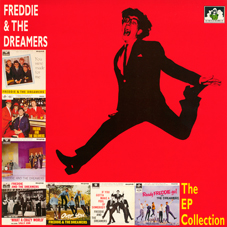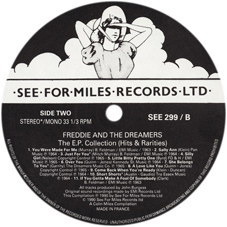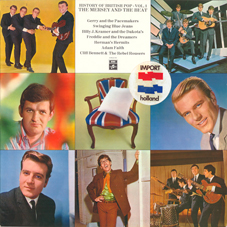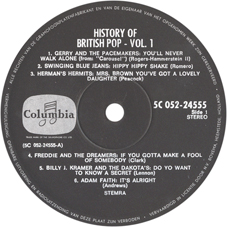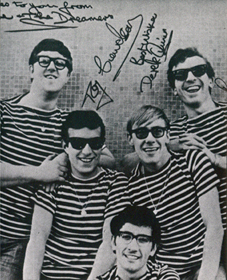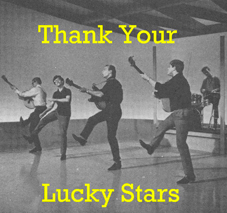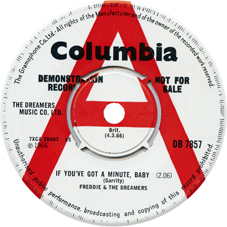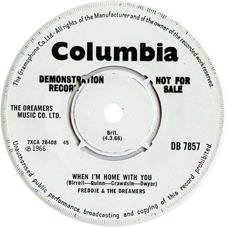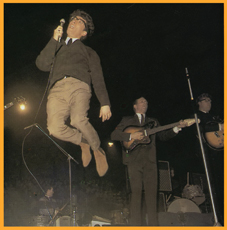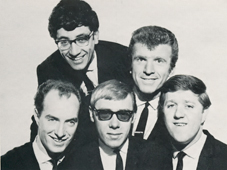However, in his book, 'The True Story Of Manchester's Music - 1958-1965', Alan Lawson explains that Liverpool was given way too much credit regarding the development of the beat boom and, indeed, Manchester was teeming with countless young groups who were musically at least as good as The Beatles in the early days.
Of course, The Fab Four were fortunate to cross paths with Brian Epstein, and later with George Martin under whose guidance their immeasurable talent could blossom completely. Still, Manchester gave us The Hollies,
Wayne Fontana & The Mindbenders, Herman's Hermits, The Dakotas, The Toggery Five and The Whirlwinds,
the latter boasting the presence of the skilled Graham Gouldman who would soon write mega-hits for The Yardbirds but also for fellow Mancunian groups.
When Herman's Hermits sang Gouldman's 'No Milk Today', it must have brought back memories to Freddie Garrity (his full name) because, among other jobs before turning professional, he had been a milkman ! Freddie, born in 1940, began playing skiffle music and formed The Dreamers in 1959. The group worked on a semi-professional basis until their breakthrough in 1963. In his book, Alan Lawson informs us that 'the first mention of The Dreamers in the fashion which became known around the world, Freddie & The Dreamers, appeared in a billing for the Three Coins [another important club in Manchester] on March 24, 1962'. On Sunday, January 27, 1963, they shared the bill with The Beatles at that same club. Not long afterwards, following a successful audition at the BBC's Manchester studios, they landed a contract with EMI to record for Columbia with John Burgess as a producer.
Apart from singer & showman Freddie, their line-up consisted of
Derek Quinn (lead guitar, harmonica and black glasses), Roy Crewsdon (rhythm guitar), Pete Birrell (bass) and Bernie Dwyer (drums). Ironically, one of their former members, guitarist Ernie Molloy, left to become a...milkman ! That's when Derek Quinn, initially a bass player, switched to lead guitar.
Their recording career was very well anthologized in 1992 on a US CD in the 'EMI Legends Of Rock'n'Roll' series (The Best Of - CDP 7-96979). Almost all tracks were presented in true stereo and there was a hidden 26th track featuring three US radio spots from 1965. Two years before, the UK See For Miles label had devoted an LP to the group in their consistently excellent 'EP Collection' series (See 299) which included both their hits and rarer cuts. However, the lack of a full proper CD devoted to them in the 1997 'At Abbey Road' collection was a huge disappointment (we got the dreadful Scaffold in its place, I presume).
This piece will focus on the recordings they made between 1963 and 1966, the original issue of their UK releases being the reference.
1963
Columbia DB 7032 * If You Gotta Make A Fool Of Somebody (7XCA 26343) / Feel So Blue (7XCA 26344)
This was the band's very first single, released on April 26, and their first big hit, reaching #3 during a nine-week run in the charts. This version of 'Fool' was recorded on March 21 with Derek Quinn playing harmonica and the sparse instrumentation proves that it was only intended as a recording test. In Lawson's book, Quinn recalls that they 'recorded the song three times', probably at different sessions, but on the See For Miles LP, Freddie is quoted as saying that 'EMI released that first test pressing as the single'. For a first effort at Abbey Road Studios, it was quite satisfactory and sounds real good in stereo on the US CD. Although James Ray's original on Caprice (#110) was, even by Garrity's account, a much better recording, their version had that 'something' which makes it stick in your mind.
The flip, 'Feel So Blue', was written by Freddie. It is an excellent, transitional rocker with a brilliant Shadows-type backing, Derek's solo sounding uncannily like Hank Marvin's in 'We Say Yeah' by Cliff Richard. It was probably cut at their second recording date, which must have taken place only a few days after the test as they had to cancel their imminent trip to play the clubs in Germany.
Columbia DB 7086 * I'm Tellin' You Now (7XCA 27331) / What Have I Done To You ? (7XCA 27332)
Yes, it was first issued as 'Tellin' and not 'Telling'. Recorded on July 8. The story is well-known ; Freddie had started the song but didn't know how to finish it, so Mitch Murray came to his rescue and they jointly created one of Merseybeat's most enduring anthems. A great song for all seasons, with all the charm, the cheerfulness and the vitality of these early British Beat records. Mitch Murray provided quite a few of them ('How Do You Do It ?' comes to mind, of course).
Another remarkable songwriter,
Les Vandyke, had written many great songs for Adam Faith which were produced by John Burgess and it's probably through this connection that Vandyke gave them 'What Have I Done To You'. A nice little song, recorded on June 19, which consolidated their comedy-style approach to Pop.
'I'm Tellin' You Now' entered the charts on August 17 and quickly rose to #2.
It would even fare better in the USA , simply two years later ! The first issue of the disc on Capitol (#5053) in October '63 went unnoticed. The US had largely missed the first Beat wave that year ; things changed once and for all after The Beatles' TV appearance on the Ed Sullivan Show in January 1964. In 1964, Mercury got the distribution deal for their records in the States but the first outings didn't catch on. Capitol had kept the rights to 'I'm Telling You Now' and in March '65 the single was re-released on their subsidiary label, Tower (#125) : it went straight to #1 !
Columbia SEG 8275 * If You Gotta Make A Fool Of Somebody/Feel So Blue/I'm Tellin' You Now/The Viper
Columbia 33 SX 1577 * Freddie & The Dreamers * If You Gotta Make A Fool Of Somebody/Some Other Guy/
Somebody Else's Girl/Yes I Do/Zip-A-Dee-Doo-Dah/Drink This Up, It'll Make You Sleep/I Understand/Sally
Anne/I'm A Hog For You/The Wedding/Money/Crying/He Got What He Wanted/Kansas City
Sub-titled 'The Two Faces Of Freddie (And The Eight Faces Of The Dreamers)' and sporting a now legendary record cover which depicted Freddie and the band in their
pajamas and nightcaps. Perhaps not as strong a debut LP as that of Gerry & The Pacemakers, to whom they were often compared, but a very enjoyable piece of Beat music just the same. It is, for the main part, comprised of covers of Rock'n'Roll classics and other recent pop hits. 'Kansas City' and 'Money' are taken at a frantic pace but have nice guitar breaks. Richie Barrett's 'Some Other Guy', which ended up in the repertoire of many groups (The Searchers and The Big Three for example), is very good, but on the other hand Freddie overdoes it way too much in Little Richard's 'He Got What He Wanted (But He Lost What He Had)'. 'I'm A Hog For You', one of many great Coasters' songs, features bassist Pete Birrell on lead vocal and Derek Quinn has kept the guitar motif at the end of each verse intact. Birrell, joined by Roy Crewdson, takes another lead on 'Zip-A-Dee-Doo-Dah' ; their version, following closely Bob B. Soxx's hit arrangement, is neither better nor worse than the one which would be done by The Dave Clark Five a bit later. The rather undistinguished 'Yes I Do' came from another Manchester act, The Clan, which included two very important figures of the early local Beat scene, singer Pete MacLaine and ace guitarist, Pete Bocking ; they had cut their own version for Decca. And then, there's 'Crying', the Roy Orbison song that Freddie liked a lot. In fact, Freddie was a big Orbison fan and he had the ability to reproduce some of Roy's vocal inflexions. This can also be felt in 'Somebody Else's Girl', a good song which was a current hit for Billy Fury. Rounding out the set were the first version of 'I Understand', 'Sally Anne' (sometimes called 'Sally Ann', without the final vowel) and a mandatory contribution from Mitch Murray, 'Drink This Up, It'll Make You Sleep'.
Columbia DB 7147 * You Were Made For Me (7XCA 27371) / Send A Letter To Me (7XCA 27372)
And yes, it was Mitch Murray who was responsible for the band's next hit. Although it seems - and indeed, is - tailored to fit the band's image, that song was first submitted to The Searchers who rejected it right away ! 'You Were Made For Me' entered the charts in November '63 and, over the course of a 10-week run, reached #3. It would later become another staple of just about every Merseybeat retrospective. Like its predecessor, the first US release on Capitol (#5137) did nothing, but its reissue in 1965 on Tower (#127) reached #21 in the charts there.
The flip was again penned
by Freddie Garrity who, all things considered, was a competent songwriter.
Their first year as professionals turned out to be spectacularly successful. They appeared on all major radio and TV shows and were featured in the film version of Alan Klein's 'What A Crazy World' alongside Marty Wilde and Joe Brown & The Bruvvers - bit like The Old Guard gives way to The New Breed. It was directed by Michael Carreras who reportedly said : 'Freddie is the only man I know who can sing, dance and remove his trousers all at the same time'. An EP titled after the film would appear at the beginning of next year.
1964
Columbia SEG 8287 * Songs From the film * Sally Ann/Camptown Races/Lonely Boy/Short Shorts
The latter number, originally performed by The Royal Teens in another film called 'Let's Rock' (alternatively titled 'Keep It Cool') in 1958, was to become the centerpiece of all subsequent Freddie & The Dreamers shows. Although it was often perceived as zany, Freddie's stage act included mid-air splits which may have influenced The Who's Pete Townshend to a certain point ! Of the four songs here, only 'Sally Ann' and 'Lonely Boy' are of real interest. The former is a jolly little piece first recorded by Joe Brown while the other is a pretty good cover of a Paul Anka smash from 1959.
Columbia SEG 8302 * You Were Made For Me * You Were Made For Me/Money/Send A Letter To Me/Zip-A-Dee-Doo-Dah
Columbia DB 7214 * Over You (7XCA 27399) / Come Back When You're Ready (7XCA 27400)
Certainly one of their best singles, it was released in February but only reached #13 in the UK. It wasn't even put out in the US since Capitol had dropped them and Mercury hadn't yet entered the picture.
'Over You' was co-written by Derek Quinn with an unknown Jones. It's a fast number with good guitar sounds, still pleasantly typical of the Merseybeat style. The other side, co-written by Alan Klein, is in a similar vein.
In April '64, Freddie & The Dreamers embarked on a nationwide tour that was headlined by no other than Roy Orbison. The supporting bill included Tony Sheridan (with The Bobby Patrick Big Six), The Federals and Wayne Fontana & The Mindbenders who had just released 'Little Darling' and were still a year away from their big hit, 'The Game Of Love'. It was a big thrill for Freddie and the band who arranged a birthday party for him when the tour reached Manchester in May. The tour program, pictured at above left, read : 'The group are vocally versatile, and play six other instruments apart from their own, and they have won a big reputation in the North as musical clowns, spicing their strong beaty music with some hilarious comedy'.
Columbia SEG 8323 * Freddie & The Dreamers * Over You/Come Back When You're Ready/Kansas City/I'm A Hog For You
Columbia DB 7286 * I Love You Baby (7XCA 27434) / Don't Make Me Cry (7XCA 27435)
It was back to the Paul Anka songbook for the next single. 'I Love You Baby' was one of Paul's very first hits way back in 1957 and the group gave it a lively rendition, augmented with some superb guitar picking from one of the best session guitarists in the UK, Big Jim Sullivan. It climbed to #16 in the charts but went virtually unnoticed in the US when put out by Mercury (#72285), except for the keenest record collectors who were lucky enough to grab the ultra rare black & white pic sleeve which came with the single.
The flip side is another infectious (some would say innocuous but who cares ?) Freddie Garrity composition who had by now fully mastered the Mitch Murray song style.
Columbia DB 7322 * Just For You (7XCA 27462) / Don't Do That Me (7XCA 27463)
'Just For You' was the title of the second film in which they appeared, along with Peter & Gordon, A Band Of Angels, The Applejacks, The Merseybeats and others. They enjoyed the privilege of singing the title tune, which came once more from the pen of Mitch Murray. This charming little ditty could really only be sung by Freddie.
His own 'Don't Do That To Me' was the perfect matching B-side. However, it was from another film, 'Every Day's A Holiday', re-titled 'Seaside Swingers' in the States. John Leyton and The Mojos also appeared on the bill. Freddie and the band performed another song, 'What's Cooking', which can be found on the American soundtrack album (Mercury MG 21031).
The single failed to make the Top 40 in England and was a complete flop in the US, to the great displeasure of Mercury.
Columbia SEG 8349 * Freddie Sings 'Just For You' * I Love You Baby/Don't Make Me Cry/Just For You/I Just Don't Understand
As Derek Johnson wrote in the back cover notes, Freddie was now known as the 'Clown Prince Of Pop', a title he always assumed with the utmost willingness. On this EP, the only new song was 'I Just Don't Understand' which was first sung by artists as diverse as Ann Margret and Tommy Adderley (the latter on Mar Mar 314, backed with a noisy version of 'Whole Lotta Shakin' Goin' On').
Columbia DB 7381 * I Understand (Just How You Feel) (7XCA 27484) / I Will (7XCA 27491)
They had already done the top side in their first album with a very sparse instrumentation but they re-recorded it with a lightly fuller sound for their seventh single. A rather weak side. However, 'I Understand' entered the UK charts in December and reached No. 5. It would be their last Top 20 entry. They certainly had the opportunity to play it during the Beatles' 1964 Christmas Show to which they were invited.
The reverse side, 'I Will', from Freddie's pen, was much, much better - a beat ballad à la Roy Orbison
with a strong orchestration and a heartfelt vocal.
In the US, the record (Mercury 72377) rose to No. 36 in April '65, hot on the heels of the Tower re-release of 'I'm Telling You Now' which had just skyrocketed to the top spot.
Columbia 33SX 1663 * You Were Mad For Me * Jailer Bring Me Water/It Doesn't Matter Anymore/Tell Me When/Cut Across Shorty/I'll Never Dance Again/What'd I Say/See You Later, Alligator/Early In The Morning/I Think Of You/Only You/Johnny B. Goode/I Don't Love You Anymore/Say It Isn't True/Write Me A Letter
Their second album was released in October and stayed true to the format of the first one. There were several rock'n'roll standards, of which 'Johnny B. Goode' (sung by the group) and 'What'd I Say' were the best. Their version of Buddy Holly's 'It Doesn't Matter Anymore', for once avoiding the string section, is particularly excellent, but 'Early In The Morning', a pretty difficult number to sing, cannot compare with either Holly's or Bobby Darin's or even Bobby Vee's versions. 'I'll Never Dance Again' was originally done by Bobby Rydell (Cameo 217, 1960) while 'I Think Of You' had been a Spring hit for The Merseybeats ; both are well executed. One of the very best cuts here is their cover of the recent Applejacks hit, 'Tell Me When' ; that's the kind of infectious tunes at which Freddie excelled. That leaves a trio of new songs, the best being the countryish 'I Don't Love You Anymore'. It was another pleasant record but nothing more. There were no new songs from the band themselves and this would soon sound the knell of success for many a group like them.
1965
Columbia DB 7526 * A Little You (7XCA 28958) / Things I'd Like To Say (7XCA 28959)
This would be the year of overseas celebrity - albeit short-lived - with a future tour of the US. However, on January 19 & 25, they went back into Abbey Road Studios to cut several sides, including the above two which were coupled for their new single. And what a superb pairing it was ! Great songs, great arrangements, great singing. 'A Little You' was written by Gordon Mills who had previously written one of my favorite Cliff Richard numbers, 'I'm The Lonely One' (Columbia DB 7203, 1964). In the US CD booklet, Freddie himself has nothing but praise for this song. He adds that it's the first song he ever did with an orchestra behind him although 'I Will' did feature an orchestra too. The flip side, 'Things I'd Like To say', is a bouncy Norman Smith song in the 'Tell Me When' style, featuring one of Freddie's best vocals to date. You can even picture him singing with a smile on his face so great is his enjoyment to do the song. There's also an echoey piano solo that's simply wonderful. It was probably played by the talented Smith who engineered so many sessions for so many groups, Beatles included of course. This song has a very special feel, the kind of which Norman replicated very successfully in 'Oh Babe, What Would You Say', an international hit he recorded in 1972 under the pseudonym, Hurricane Smith.
Columbia SEG 8403 * Ready Freddie Go * Silly Girl/Little Bitty Pretty One/In My Baby's Arms/She Belongs To You
They were decidedly in top form at this stage in their career judging by the quality of this EP, released immediately after the previous single (which, by the way, went to No. 26 in England and later to No. 48 in the US). The disc was titled after the 'Ready Steady Go' TV show which was already so popular (the Who went a step further in '66 with their 'Ready Steady Who' EP). 'Silly Girl' is another infectious song with excellent guitar throughout. When the song was later released in the US, on the 'Do The Freddie' LP (Mercury 21026), they managed to cut off a bit of the intro ! 'Little Bitty Pretty One' was a big hit for Thurston Harris in 1957 (Aladdin 3398) ; it is competently handled by the group. 'In My Baby's Arms' is a very good medium paced song with some of Freddie's Orbison mannerisms in the chorus and a nice guitar break. Lastly, Freddie contributes a typical slab of addictive Merseybeat in 'She Belongs To You'.
Columbia SEG 8457 * Do The Freddie * I Wonder Who The Lucky Guy Will Be/A Windmill In Old Amsterdam/Do The Freddie/A Love Like You
Freddie and his boys had perfected a stage choreography (with Freddie waving his arms about and leaping up and down at frequent intervals) which, when seen on US TV shows like 'Shindig' and 'Hullaballoo' in early '65, started a dance craze called 'The Freddie' on which Mercury lost no time to capitalize ! While the band was on tour there, the company had two songwriters commissionned to write a song with that name. A swinging backing track with horns and a female chorus was prepared without any Dreamer, all Freddie had to do was add his vocal with a strong dose of his manic laugh thrown in for good measure - which he did on April 2, to be precise. 'Do The Freddie' was born and was rush released on Mercury 72428 with 'Tell Me When' on the flip. It reached No. 18. The subsequent album of the same name reached a respectable #85.
In England,
there was no such single. 'Do The Freddie' appeared later in the year on the band's next EP which introduced three new songs. 'A Windmill In Old Amsterdam' was a children's song and somehow paved the way for the future. Curiously, it was selected for the band's next Mercury single (#72487) ; although issued with a picture sleeve, it flopped and signaled that the 'Freddiemania' was over.
As for 'A Love Like You', which came from the same January 19 session as 'Things I'd Like To Say' and had been only available on the 'Do The Freddie' LP, it was again co-written by Derek Quinn and is a well-crafted song with a strong melody and the kind of basic but lovely backing the Dreamers provided so well.
Columbia DB 7720 * Thou Shalt Not Steal (7XCA 28703) / I Don't Know (7XCA 28704)
Although credited to 'Scott' on the original single, it was credited to John D. Loudermilk on the 'Fun Lovin' Freddie' LP so it's hard to know what version inspired Freddie to cut 'Thou Shalt Not Steal' but he gives it a country-pop flavor, again infused with some Orbison stylings. It was arranged by Ivor Raymonde who also conducted the orchestra. In the US, the song was replaced with 'A Windmill In Old Amsterdam'. The flip, 'I Don't Know', was common to both releases.
Columbia 33SX 1785 * Sing-Along Party * Various medleys of songs.
In November, the band's third LP was out. It was an oddity comprised entirely of medleys of songs of different eras, including some of their own previous hits, with accompaniment directed alternately by Ivor Raymonde and Tony Osborne. Although nicely done, it was a straight middle-of-the-road production of no real interest and which gave a clear indication of the road they were beginning to take - cabaret and pantomime were just around the corner. One of the medleys, combining 'If You Gotta Make A Fool Of Somebody', 'Over You' and 'I'm Telling You Now', was by far the most interesting. It was released by error, but in true stereo, on the first volume of the wonderful Dutch 'History Of British Pop' series of albums in 1972.
1966
Columbia DB 7857 * If You've Got A Minute Baby (7XCA 28407) / When I'm Home With You (7XCA 28408)
Columbia DB 7929 * Playboy (7XCA 28411) / Some Day (7XCA 28412)
Columbia DB 8033 * Turn Around (7XCA 28529) / Funny Over You (7XCA 28530)
Anyone who could have thought they were definitely finished by now should have taken a listen to the singles they put out that year, beginning with Freddie's tuneful 'If You've Got A Minute Baby'. With a piano/guitar intro somewhat reminiscent of 'Eight Days A Week', it perpetuated that unique, purely English style of songs which launched the first wave of the British invasion. The very good flip, 'When I'm Home With You', was written by all four Dreamers and incorporated some (then currently popular) Latin/Brazilian sounds.
Freddie said he didn't care for both subsequent singles but frankly, I don't know why because they're not bad at all. Perhaps the fact that their sound had now evolved to include organ and fuzz guitar in 'Playboy' worried him. The song wasn't even issued in the States ; for their last release by the group, Mercury opted to couple 'Short Shorts' with 'Some Day' (#72604) ! 'Turn Around' was an old Harry Belafonte number from 1959 and indeed nothing special but its flip, 'Funny Over You', was an excellent song (another Garrity credit) with a good rhythm and a clever use of the strings. It was however a belated release because it had been included one year earlier on the US 'Fun Lovin' Freddie' LP.
A NOTE ON FREDDIE & THE DREAMERS' US LP
The US record companies, having jumped very late on the British Beat bandwagon, made a show of rare zeal to earn a quick buck out of it. They released whatever they could get from the UK record labels in the most hazardous way with a complete disregard for the bands' artistic approach and progression. The Beatles suffered from that until 1967, just like all their peers. The Animals even saw their big hit, 'House Of The Rising Sun', violently and inexplicably shortened from 4'15 to 2'59 on their first US LP !
The first two Mercury LPs by Freddie & The Dreamers (self-titled, Mercury MG 21017 and 'Do The Freddie', MG 21026) contained tracks from their first two UK LPs plus several single cuts. They reached #19 and #85 respectively on the album charts. The third ('Frantic Freddie', MG 21053) had one cut which was never released in England at the time : 'How's About Trying Your Luck With Me', a Goffin-King composition which would have perfectly suited Herman's Hermits. The fourth ('Fun Lovin' Freddie', MG 21061) had two cuts which were issued much later in England ('Funny Over You' and 'I Fell In Love With Your Picture', the latter written by Hal David & Burt Bacharach) and one which was never released at all : 'Don't Tell Me That', a great early Roger Cook-Roger Greenaway collaboration featuring an unexpected rocking piano break in the middle !
Apart from the 'Seaside Swingers' soundtrack, the other American albums were on Tower ; these were in fact various artists compilations because Tower had only four tracks by the group to rehash - but they included their two biggest hits.
I have purposely only listed the monaural catalog numbers ; the stereos begin with the 'SR' prefix but, as usual with those 60's US pressings of British stuff, the monos are much preferable because of that dreadful and criminal 'reprocessed stereo' which plagued most of their stereo counterparts.
Freddie & The Dreamers have too often and unfairly been an easy target for music critics but in music, like in all other forms of art, there's room for different kinds of talent. It's true that, in the words of Lillian Roxon, 'they never at any time managed to rise to the rarefield levels that made The Beatles stars', but that certainly wasn't their goal. They were aware of their weaknesses and they simply wanted to entertain people and make them happy with their mixture of comedy and beat music. And their music, which had its roots in rock'n'roll first, was always pleasant, sometimes excellent and helped lay the very foundations of the British Beat boom that shook the record industry for good from 1963 on. Whatever can be said, 'I'm Telling You Now' still resonates as one of the anthems of the Merseybeat era and it's one damn good recording. Now, put any of their early albums on the turntable or any of their 'Best Of' CDs in the player, and you're guaranteed to have a real good time.
© PAUL VIDAL * Privas, France * 2020 - 2024

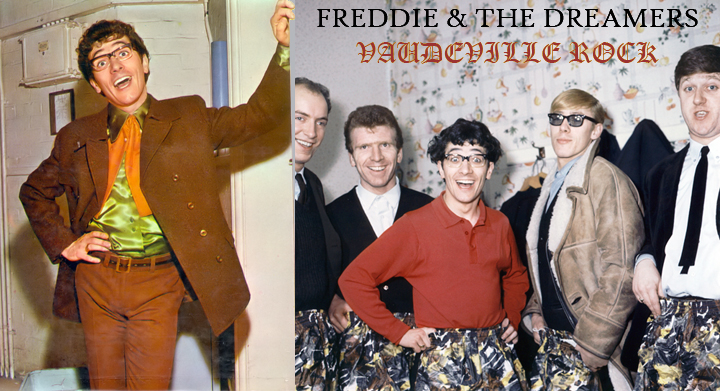
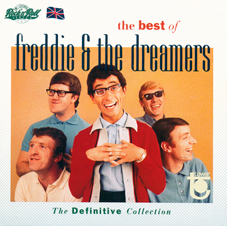
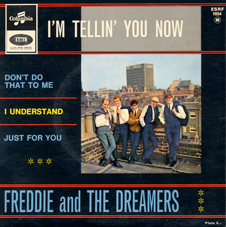
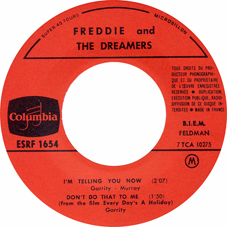 A rare French EP
A rare French EP 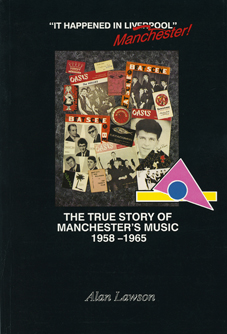
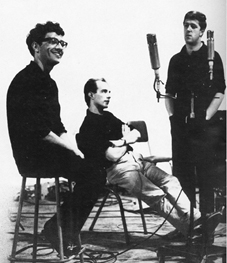
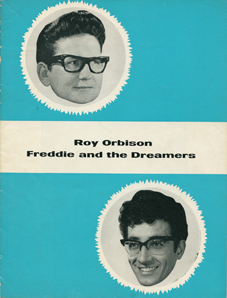
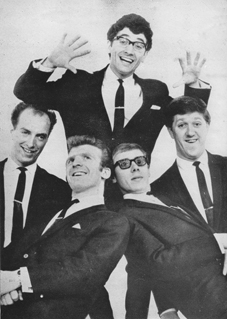
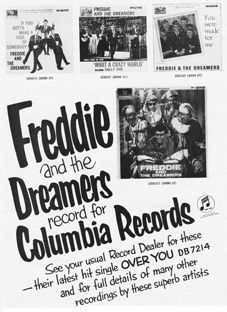 The tour program with Roy Orbison from 1964
The tour program with Roy Orbison from 1964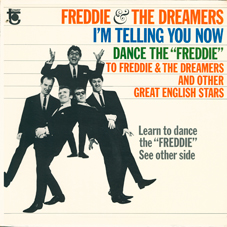
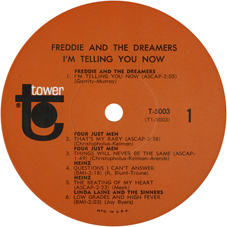
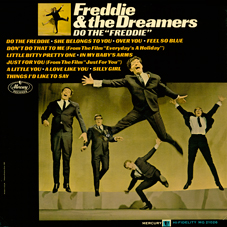
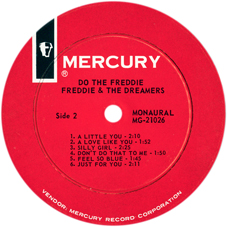
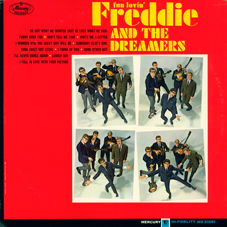
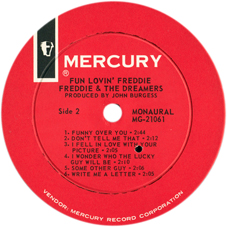 Some of the US albums
Some of the US albums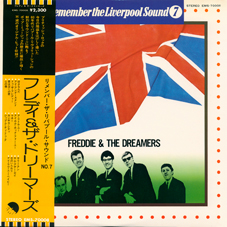
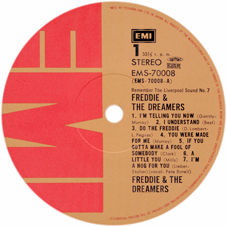 A Japanese compilation
A Japanese compilation 